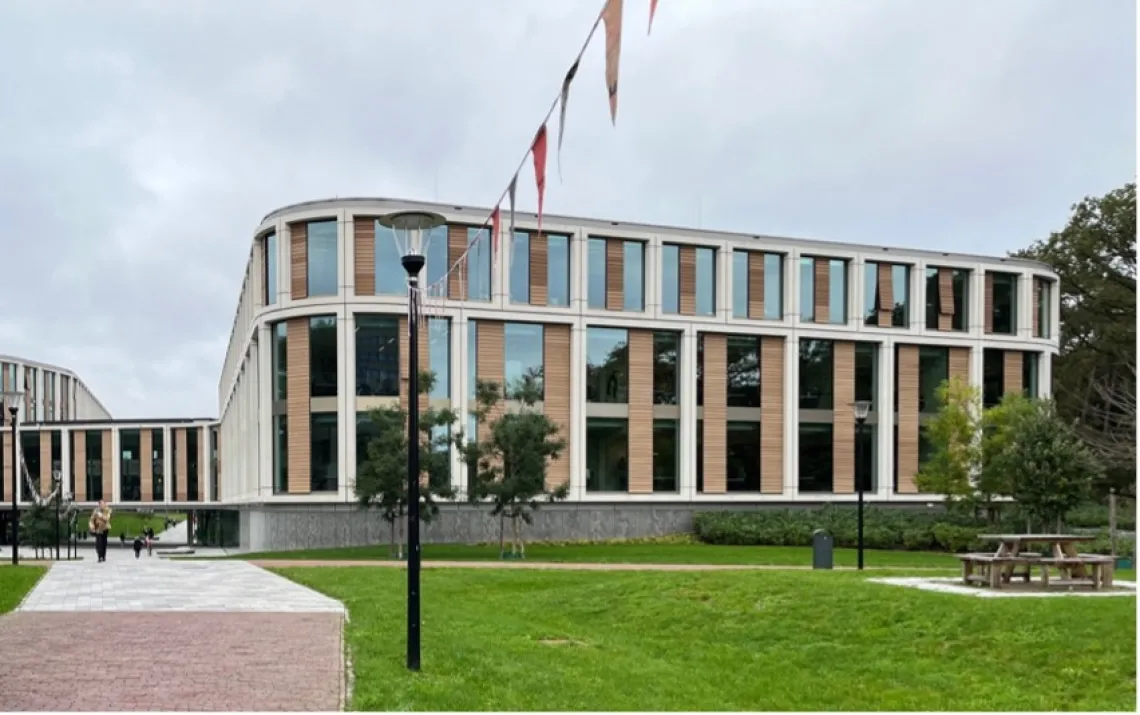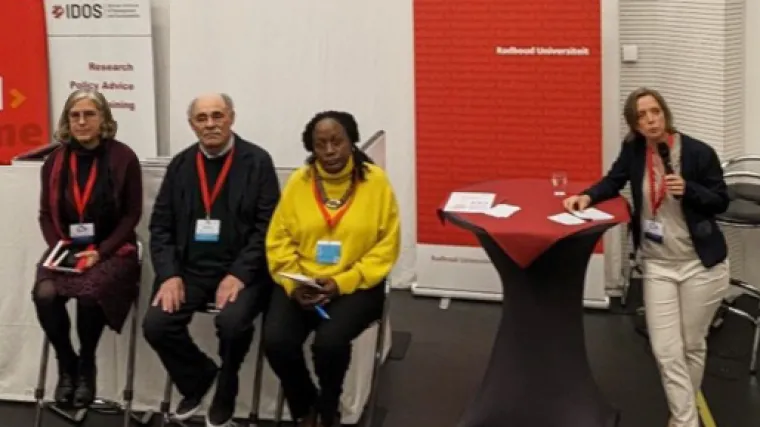At the Radboud University Conference on Earth System Governance

Robert G. Varady
In January 2023 I participated in a UNESCO/Water Future-led initiative to explore how a new global mechanism could inform policymakers for more efficient and sustainable water governance. The findings of our task force were presented as a white paper to the March 2023 UN Conference on Water.
As a sequel to that involvement, I was invited by IDOS, the German Institute of Development and Sustainability, to participate in a session at the Conference on Earth System Governance hosted by Radboud University in Nijmegen in The Netherlands. The theme of the conference was “Bridging Science and Societies for Sustainability Transformations,” and the objective of our panel was to continue the ongoing UN Water Conference dialogue in a session titled, “Bridging the gap: Science-policy dialogue on water as a catalyst for sustainable development and climate action.”
As noted in the abstract for our session, the UN Water Conference – the first such conference since 1977 – included a Water Action Agenda with numerous commitments from a variety of stakeholders. The conference took place at a point in time where water governance at global level was highly fragmented, lacked coherence and coordination, featured diverse fora and initiatives with varying ownership and lacking governmental legitimacy, and was characterized by a hotly debated role of the private sector, inadequate inclusion of civil society and a weak science-policy interface.
The water crisis mostly manifests itself at local and transboundary levels, but the impact of global phenomena, such as climate change and the key role water resources play as a global commons through teleconnections in water uses and in stabilizing the earth system, require coordinated and holistic approaches at the global level.
The Panel

Panelists (L to R): Ines Dombrowsky, Robert Varady, Yunia Musaazi, Annabelle Houdret. not pictured, Zoom panelists included Johannes Cullmann and Aditi Mukherji.
Robert G. Varady
The organizer, Dr. Annabelle Houdret, a senior researcher at IDOS and speaker of the BonnWaterNetwork, assembled a five-person panel, with herself as moderator:
- Johannes Cullmann, UN-Water Vice Chair and Scientific Advisor to the President of the UN General Assembly, World Meteorological Organisation (joined via Zoom)
- Ines Dombrowsky, Head, Environmental Governance and Transformation to Sustainability research programme, German Institute of Development and Sustainability (IDOS)
- Aditi Mukherji, Director, Climate Adaptation and Mitigation Impact Area Platform, International Water Management Institute (IWMI) (joined via Zoom)
- Yunia Musaazi, Executive Director, Uganda Water and Sanitation NGO Network (UWASNET) & Water Integrity Network
- Robert Varady, Research Professor Emeritus of Environmental Policy, Udall Center for Studies in Public Policy, University of Arizona
This discussion began with inputs on the current state of global water governance and the main outcomes of the UN Water Conference. On this basis, the panelists reviewed the outcomes of the conference: Did it succeed in advancing the governance of water as a global common good? Did it improve the integrated achievement of water-related Sustainable Development Goals and coordination with relevant UN institutions? The panelists were asked to reflect on the causes and consequences of policy incoherence and related reform needs, including to adequately integrate different water users.
Is a "Governance Format" the right choice for today's water problems?
In my own case, I was asked to respond to two questions, of which the first was:
Given your work on global water governance and the institutional landscape, could you address the question if the ‘governance format’ of an UN conference was the right choice at this point in time? Did it sufficiently reflect all major stakeholders, and what is the legitimacy and reach of this conference?
I began my response to the first question by referring to a statement in our session’s abstract, “Water governance at global level remains highly fragmented, lacks coherence and coordination, features diverse fora and initiatives, with varying ownership and lacking governmental legitimacy.”
Below is the text of my comments:
While there are certainly elements of validity in that abstract’s statement, it’s worth looking more closely and in a more nuanced way at some of the assertions above. That can help us determine whether the ‘governance format’ of the March 2023 UN conference was a timely and suitable choice for addressing the challenges and existing shortcomings of global water governance.
My observations and insights are based on work my team and I have done over the past two decades on the concept of “global water initiatives” (GWIs). By that term, I mean the complex and globally influential mosaic of institutional frameworks, organizations, events, declarations, professional societies, organizations, and networks that focus on water-resources governance. Some of these institutions lie within the United Nations umbrella, but the vast majority of them are independent of the UN. What they share is a global outlook and purview.
One of the notable things we found in our research was that, in spite of the venerable nature of these global water initiatives (some date from the 1880s) and their prevalence and proliferation (they number in the hundreds), the phenomenon has remained starkly understudied and, consequently, unappreciated. An obvious result is that critics have seized on some of the glaring and daunting obstacles these institutions face: duplication of effort; contending agendas; competition for resources; fragmentation of effort; lack of coordination; and inability to achieve, document and quantify on-the-ground policy accomplishments.
Our research (Varady et al. 2022) suggests that the ensemble of global water initiatives is much like an ecosystem, exhibiting a rich variety of forms, niches, and purposes. Among our relevant findings, we note that:
- over the decades, GWIs have diversified, expanded their constituencies, and gradually extended their influence over how water is perceived, governed and managed;
- the institutional landscape within which GWIs exist and operate is continuously shifting to accommodate and lubricate the spread of new ideas, ways of thinking, and available science and tools;
- networks, megaconferences and their declarations, and water-themed journals likely will continue to be at the leading edge of global water governance and policy.
Our findings indicate that as the number of GWIs grows, while such proliferation has necessarily led to some duplication, it has also encouraged diversity and interconnectedness. On balance, GWI activity tends to increase awareness-raising, information-sharing, network-building, agenda-setting, and on-the-ground action. GWI behavior both mirrors and influences prevailing worldviews on water governance and management. Taken together, GWI efforts continue to shape international water discourse.
We also learned that the advent of the Millennium Development Goals and Sustainable Development Goals has enhanced the relevance of the United Nations, especially that of UN-Water, the network of water-related United Nations (UN) agencies. At the March 2023 UN Water Conference, a UNESCO-led group including several members of this panel offered some suggestions for how to address and reduce the growing gaps between the severity and complexity of the water-related problems the world is facing and the implementation of policy innovation and tools.
The Future of Efficient, Cooperative Water Governance
The second question I was asked was:
The overall geopolitical context of global governance is currently undergoing rapid and deep changes. This is constraining cooperation and commitment among participating nations. At the same time, internal politics also have repercussions on water resources and related policies. How do you see the chances of more efficient global water governance in this context?
My response was:
Science and technology offer potent tools that can help us address serious problems relating to water management. We all know that satellites, supercomputers, large data sets, sophisticated models, and AI can assist decisionmakers and managers in many, many ways. Climate change, drought, flooding, urban water-systems optimization, reuse, desalination—the list is long—all benefit from skillful application of those tools. Like many of you, I count myself as a believer in the power of science, logic, and rationality.
But just as some bacteria resist antibiotics, there is one hugely important domain that has remained resistant to the lure of science and technology: politics. And by that, I mean both a nation’s internal politics and large-scale geopolitics. There are numerous, well-known examples of each, but I’ll highlight just a few.
Within domestic politics, lack of harmony is exemplified by Democratic-Republican standoffs in the U.S., and by the evident struggles within the planning establishments in China and India to balance economic development and carbon reduction.
In the broader global political arena, the potential for disunity is illustrated by such mega-disagreements as the current situation in Israel and Gaza, the Ukraine war, and the rising influence of a new coalition of large nations, BRICS (Brazil, Russia, India, China, and South Africa).
The dynamics and consequences of these political processes constrain—and in the extreme—prevent cooperation and commitment among participating nations. Because of the overriding influence of politics in setting national and international goals and allocating resources, it’s fair to say that this process, in its multiple manifestations, is the 200-kilo gorilla in our discussion. It’s likely the single biggest reason the SDGs have failed to meet their goals.
So, can anything be done — via either (1) the loose-knit network of global water initiatives or (2) more directly, through the auspices of the UN — to mitigate the destructive effects of politics on water governance and management?
With regard to the first of these resources, earlier I referred to what I called a mosaic of institutional frameworks, organizations, events, declarations, professional societies, organizations, and networks that focus on water-resources governance. These institutions are by definition outsiders to national political processes. While some are intergovernmental, most are nongovernmental.
The networks that are in place, along with the programs they operate and the outputs of those programs, can exert influence most effectively by demonstrating successful achievements on the ground. The declarations that emerge from events often contain innovative and doable concepts that could appeal to opposing points of view.
At the same time, the availability of powerful means of disseminating information and findings permits these global institutions to insert themselves more directly within the political process. To use current sports terminology, they need to step up and engage more directly.
As for the second grouping of institutions, those within the UN family, the emergence in the early 2000s of UN-Water was a notable step forward. For the first time, serving as a “coordinating mechanism,” it brought together the ensemble of water divisions within the family of UN agencies. Working in concert with their member states, this group offers tangible opportunities to overcome political obstacles.
In the past, UN-Water mostly served as an information clearinghouse, a venue for discussion among sometimes competing water agencies, and a publisher of the annual World water Development Reports. As a neutral actor, UN-Water possesses the ability to help depoliticize potentially volatile situations. More concretely, it can assist its member states accomplish specific, doable, cost-effective, and sustainable actions.
Reference
Varady, R. G., T. R, Albrecht, A. K. Gerlak, and A. C. Haverland. 2022. Global water initiatives redux: A fresh look at the world of water. Water 14, 19: 3093; 44 pp.

